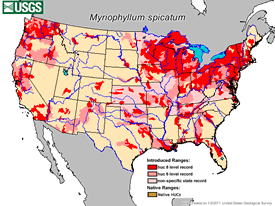Home | Detectives | Suspects | Background Check | Kids' Headquarters | Top Desk Administrator | Case Files
Myriophyllum spicatum
THE CRIMES: Forms dense mats on the surface that interfere with the use of lakes and rivers. Removes native plant food sources for waterfowl. Affects water quality.
DESCRIPTION: Feathery submerged plant with long, stringy stems and small reddish flowers above water during the mid-summer.
The Interrogation
Where are you from?
I originated in Northern Europe and Asia.
How did you get here?
North America became my new home between the late 1800s and
the early 1940s. Some speculate that I was brought over intentionally and others
say that I was a stowaway in ship ballast water and snuck into the Chesapeake
Bay area. One theory is that I was used as packing material for worms and sold to
fishermen in Oklahoma. I can now be found in over 40 states.
What’s your problem?
My motto is, “You can never have too much of a good thing.”
I reproduce from fragments and spread rapidly. I’ve been known to cover a lake surface
from shore to shore, making it difficult for a boat to travel over the lake. Once I create
a dense mat on the surface, I shade native species causing them to disappear and the lake is
mine! My infestations not only affect the plants, but the birds and fish, too.
How can we control you?
Millions of dollars are spent each year on trying to control little ol’
me. Many control methods have worked out pretty well. You’ve experimented with harvesting
and chopping me down, which works but not if you are not careful. The plant fragments you
cut off can be carried downstream to easily infest a new site or even multiple sites.
Humans have figured out that there are fish and insects that eat me. They are growing those
nasty things and letting them go around me to keep me in check.
The most important way to keep me from spreading is to wash and inspect your boats
after a day on the lake. My fragments cling to your boat and trailer and when we get a chance, we attack
another body of water.
REWARD:
The honor of protecting our water resources—A healthier environment
and more opportunities to enjoy our natural areas.
